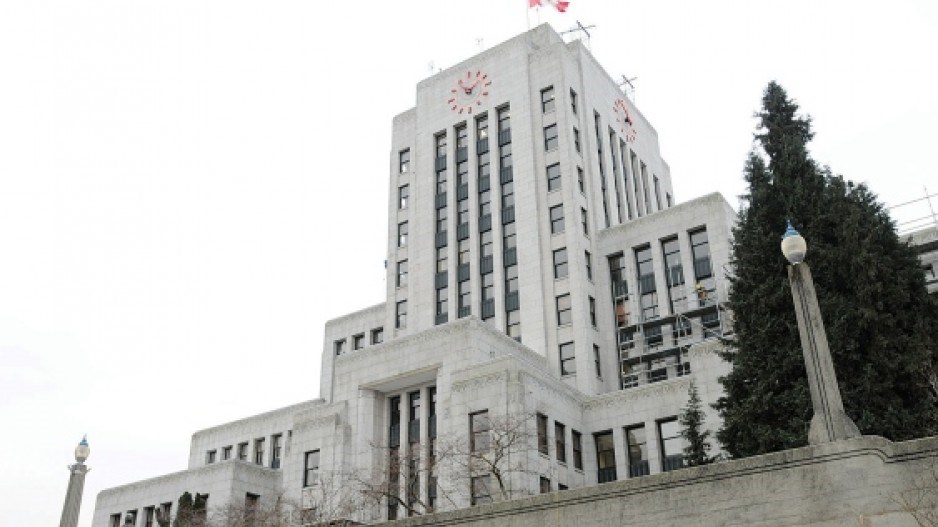Dig in to your wallets Vancouver, your taxes are going up… again.
After a heated political debate that pitted the ruling Vision Vancouver against the NPA, council voted 7-4 Tuesday to raise taxes by 2.3 per cent next year to help balance a $1.2 billion operating budget.
The tax hike is in addition to increases in utility fees, including 4.2 per cent for water service and 9.9 per cent for sewer. Solid waste costs remain the same.
For a single-family house assessed at $1.1 million, the increases translate to an estimated tax bill of $2,011 and another $1,198 in utility fees – solid waste ($261), sewer ($345) and water ($592) – for a total of $3,209.
That’s a spike of about $100 over this year’s bill. For a business property assessed at $589,000, the total bill comes to $5,397, an increase of about $150.
It took council more than two hours to reach a decision on the increases, largely because of an unsuccessful attempt by NPA Coun. George Affleck to defer the vote until city staff could find $7 million in savings to reduce the property tax hike to 1.3 per cent. That savings, Affleck said, would keep the tax increase closer to the rate of inflation.
“It’s the right thing to do for the taxpayers of Vancouver,” said Affleck, who suggested cuts could be made to the planning and communications departments and the offices of the mayor and city manager.
In shooting down Affleck’s request, Mayor Gregor Robertson defended the work of city staff for balancing a budget that leaves Vancouverites with one of the lowest tax rates in the region and funds a wide array of services.
“This is a callous and reckless approach to budgeting – throwing a massive cut to the city and the people who serve our citizens, at the buzzer,” said the mayor, noting Affleck requested staff find $7 million in savings before the end of the month.
Affleck said he was disappointed his motion was shot down by Vision Vancouver and Green Party Coun. Adriane Carr, who noted a city survey of residents found that 53 per cent of respondents agreed with a 2.3 per cent tax hike in return for city services.
“There is too much fear mongering in the public around tax increases,” Carr said. “My belief is that people want good services. We have done previous surveys which have shown, in fact, public support for a greater [tax] increase than we even put into the budget because they link it with the services that they get.”
Carr later voted against the 2.3 per cent tax hike. So did Affleck and fellow NPA councillors Elizabeth Ball and Melissa De Genova.
Carr told the Courier in an email after the meeting that she would have voted for a tax hike "if it had been a separate recommendation, but it was wrapped into the recommendations to adopt the whole 2016 operating budget and I was not prepared to support the operating budget due to concerns about insufficient details and transparency." Those details, she added, included no breakdown on the budget for the mayor's office and what the city was spending on cycling education programs in schools.
At least 31 per cent of services go to pay for policing and the work of firefighters. Another 22 per cent is spent providing utilities. Next year, $2.8 million will be directed at cleaning up public spaces and $2.1 million will help reduce permit wait times at city hall.
Council also approved a $325 million capital budget, including $27.8 million to replace fire trucks, $30 million for sewer replacement, $16 million for upgrades to the Burrard Bridge, $12 million for social housing in False Creek and $6.5 million for childcare.
Fees will go up in many areas, with residents noticing an average of a 1.4 per cent spike in user fees at park board facilities. Fees related to development, trades and associated permits and approvals will jump by two per cent. Developers will see rezoning fees increase by 30 per cent. Residents connected to the Southeast False Creek neighbourhood utility will also see a slight increase in rates.
In recent years, tax increases in Vancouver have ranged from 1.4 per cent to 2.9 per cent, which have been considered “modest” by Vision Vancouver politicians. Annual inflation has run between 0.1 per cent and 2.3 per cent.
Taxpayers can expect at least a combined three per cent in hikes to property taxes and utility fees, on average, over the next five years, according to city staff’s budget report. That’s largely because the city says there is a need to renew infrastructure for water conservation and sewer separation.
Other pressures on city spending includes pay increases for employees, particularly firefighters and police officers. Collective agreements for the majority of city bargaining units expire at the end of this year.
“Limiting future wage growth to levels affordable to taxpayers will be an important aspect of achieving a balanced budget while keeping property tax increases in line with inflation,” said the city’s “2016-2020 Budget Outlook” document released in October.
The bulk of the city’s operating revenues are generated from property taxes (57 per cent) and utility fees (20 per cent). Other sources of revenue are licence and development fees, program fees, parking and investments.
To read more news from the Vancouver Courier, visit www.vancourier.com
@bizinvancouver




